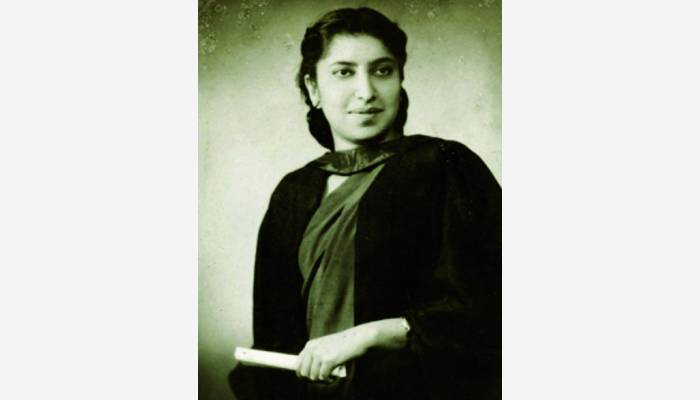
or

The Mother of ‘PILs’!
Pushpa Kapila Hingorani was a leading lawyer of the Supreme Court of India and described by many as an “institution” by herself. Kapila Hingorani’s most notable contribution to law and society was the initiation, together with her lawyer husband, Mr. Nirmal Hingorani. She was, until her passing away on December 30, 2013, the senior most woman lawyer enrolled with the Supreme Court. Kapila Hingorani became the first woman lawyer to have her portrait unveiled in the Supreme Court library in its 67-year history. The Supreme Court decided to put a portrait of a woman lawyer in one of its libraries for the first time in India’s top court history.
Born on December 27, 1927 in Nairobi, Kenya, Kapila Hingorani was the first girl from her community to travel from Nairobi to the U.K. in the year 1947 for higher studies. She graduated in the year 1951 from Cardiff University, of which she is believed to have been the first Indian woman student and was later to become an Honorary Fellow. She qualified as a Barrister from the Hon’ble Society of Lincoln’s Inn, London. She started law practice in the Supreme Court of India in the year 1961, at a time when there were just three women lawyers at the Supreme Court. Prior to starting her independent practice, Kapila Hingorani assisted the first Attorney General of India, Mr. M. C. Setalvad, and appeared in landmark cases leading to the development of constitutional law in India.
The very first PIL case in India, which was filed and argued by Kapila Hingorani in the Supreme Court, pertained to prisoners languishing in jail awaiting trial for cruelly long periods, at times exceeding the period they would have been in jail had they been tried, convicted and given maximum sentence. This PIL led to the reading of the fundamental right of speedy trial as being implicit in Article 21 of the Constitution and to the immediate release of about 40,000 under trial prisoners. The Supreme Court Bar Association, in its Resolution of March 2, 1979, recorded the “deep appreciation of the Bar Association in regard to the services rendered” by Kapila Hingorani in the Under trial Prisoners’ Case.
Kapila Hingorani, along with Mr. Nirmal Hingorani, took up almost 100 PIL cases pro bono (till 2013), which, in practical terms, have provided relief to millions of people at their doorsteps. Several of the PIL cases have led to change of law and development of constitutional law. Indeed, the jurisprudence of PIL itself has had an immense mobilizing effect throughout the country over the years, resulting in the filing of PIL petitions by public spirited citizens seeking remedies for the numerous unimaginable maladies plaguing the modern Indian society. Indian PIL has sought to be emulated in various jurisdictions across the world. Kapila Hingorani’s engagement with PIL continued till the end – she was authoring a book on the evolution and development of PIL in India.
Kapila Hingorani had to initially overcome prejudices within the legal fraternity towards such socio-legal work at the cost of professional cases. Over time, she received recognition and honour for her work and service to society from both national and international institutions and organizations. The Cardiff University, where Kapila Hingorani was an undergraduate in 1947, also conferred upon her the Honorary Fellowship of the University in 2007. More recently, Kapila Hingorani was honored by the Supreme Court Bar Association on Law Day in 2011 for completing fifty years at the Bar.
The Supreme Court of India held a Full Court Reference on February 13, 2014, for the first time for a woman lawyer, with the Chief Justice of India (on behalf of the entire judiciary), the Attorney General of India and the President of the Supreme Court Bar Association paying rich tributes to Kapila Hingorani, while lauding her pioneering role in the genesis of PIL, and her influence over the movement as a whole.
In addition to her efforts to use the judicial process to realize human rights of the disadvantaged, Kapila Hingorani spearheaded several movements in India, ranging from the establishment of Family Courts to the ban of amniocentesis and other sex determination tests to check female feticide to the prosecution of dowry crimes to the realization of the rights of women and children. She wrote extensively on diverse legal issues and has several publications to her credit. She regularly provided, for decades, legal aid and para-legal training, in addition to delivering lectures on legal issues to academicians, lawyers, NGOs, police officers and university students. She helped form many NGOs that are functioning successfully in India
The LW Bureau is a seasoned mix of legal correspondents, authors and analysts who bring together a very well researched set of articles for your mighty readership. These articles are not necessarily the views of the Bureau itself but prove to be thought provoking and lead to discussions amongst all of us. Have an interesting read through.

Lex Witness Bureau

Lex Witness Bureau

For over 10 years, since its inception in 2009 as a monthly, Lex Witness has become India’s most credible platform for the legal luminaries to opine, comment and share their views. more...
Connect Us:


The Grand Masters - A Corporate Counsel Legal Best Practices Summit Series
www.grandmasters.in | 8 Years & Counting
The Real Estate & Construction Legal Summit
www.rcls.in | 8 Years & Counting
The Information Technology Legal Summit
www.itlegalsummit.com | 8 Years & Counting
The Banking & Finance Legal Summit
www.bfls.in | 8 Years & Counting
The Media, Advertising and Entertainment Legal Summit
www.maels.in | 8 Years & Counting
The Pharma Legal & Compliance Summit
www.plcs.co.in | 8 Years & Counting
We at Lex Witness strategically assist firms in reaching out to the relevant audience sets through various knowledge sharing initiatives. Here are some more info decks for you to know us better.
Copyright © 2020 Lex Witness - India's 1st Magazine on Legal & Corporate Affairs Rights of Admission Reserved